- Home
- Jim Thompson
Now and on Earth
Now and on Earth Read online
Now and On Earth
Jim Thompson
Little, Brown and Company
New York Boston London
Begin Reading
Table of Contents
About the Author
Preview of Cropper's Cabin
Copyright
All rights reserved. In accordance with the U.S. Copyright Act of 1976, the scanning, uploading, and electronic sharing of any part of this book without the permission of the publisher constitute unlawful piracy and theft of the author’s intellectual property. If you would like to use material from the book (other than for review purposes), prior written permission must be obtained by contacting the publisher at [email protected]. Thank you for your support of the author’s rights.
1
I got off at three-thirty, but it took me almost an hour to walk home. The factory is a mile off Pacific Boulevard, and we live a mile up the hill from Pacific. Or up the mountain, I should say. How they ever managed to pour concrete on those hill streets is beyond me. You can tie your shoelaces going up them without stooping.
Jo was across the street, playing with the minister’s little girl. Watching for me, too, I guess. She came streaking across to my side, corn-yellow curls bobbing around her rose-and-white face. She hugged me around the knees and kissed my hand—something I don’t like her to do, but can’t stop.
She asked me how I liked my new job, and how much pay I was getting, and when payday was—all in one breath. I told her not to talk so loud out in public, that I wasn’t getting as much as I had with the foundation, and that payday was Friday, I thought.
“Can I get a new hat then?”
“I guess so. If it’s all right with Mother.”
Jo frowned. “Mother won’t let me have it. I know she won’t. She took Mack and Shannon downtown to buy ’em some new shoes, but she won’t get me no hat.”
“ ‘No hat’?”
“Any hat, I mean.”
“Where’d she get the money to go shopping with? Didn’t she pay the rent?”
“I guess not,” Jo said.
“Oh, goddam!” I said. “Now, what the hell will we do? Well, what are you gaping for? Go on and play. Get away from me. Get out of my sight. Go on, go on!”
I reached out to shake her, but I caught myself and hugged her instead. I cannot stand anyone who is unkind to children—children, dogs, or old people. I don’t know what is getting the matter with me that I would shake Jo. I don’t know.
“Don’t pay any attention to me, baby,” I said. “You know I didn’t mean anything.”
Jo’s smile came back. “You’re just tired, that’s all,” she said. “You go in and lie down and you’ll feel better.”
I said I would, and she kissed my hand again and scurried back across the street.
Jo is nine—my oldest child.
2
I was tired, and I hurt. The lung I’d had collapsed during the winter seemed to be filled with molasses, and my piles were torturing me.
I hollered when I got inside the door, but no one answered so I supposed Mom was gone, too. I went in the bathroom and washed, and tried to do something about my piles, and washed again. No good. I went at it again, and I washed some more. And then I remembered that I’d already done the same thing about six times, so I stopped.
The refrigerator did have some ice-cubes in it. Nothing but ice-cubes, and some old celery, and a few grapefruit, and a stick of butter. But that was something. Mom has a hard time getting the trays out, and when she does she usually leaves them out. Roberta never puts any water in the trays. She’ll take them out, remove all the cubes, and put them back without a drop of water. Jo and I are about the only ones in the house who always fill the trays and put them back where they belong. If it wasn’t for us, we’d never have any ice.
God, listen to me rave! And about ice-cubes. I don’t know what’s getting into me.
While I was standing there drinking and scratching and wondering about things in general, Mom came in from the bedroom. She’d been asleep, and she was still barefooted. Mom has varicose veins. She’s always had them as far back as I can remember. Or—that’s not true either. Her legs were never real good, but she didn’t have those veins until I was nine years old. I remember how she got them.
It was about a week after Frankie, my younger sister, was born. Pop was down in Texas, trying to complete an oil well. We were existing in a shack deep down on Oklahoma City’s West Main Street. A tough part of town in those days; I guess it still is.
Margaret—that’s my older sister—and I were sort of living off the neighbors, and Mom wasn’t eating much. So that left only Frankie to take care of. But she couldn’t eat handouts, and Mom couldn’t nurse her, and we only had fifty cents in the house.
Well, Margaret and I went down to the drugstore after a jar of malted milk, and on the way back a group of the neighborhood hoodlums chased us. And Margaret dropped the bottle. It was all wrapped up in that tough brown paper, and we didn’t know it was broken until Mom unwrapped it.
No, she didn’t scold or spank us—to the best of my recollection we never received a real spanking—she just sat there among the pillows, and something terrible happened to her face. And then she placed one starved hand over her eyes and her shoulders trembled and she cried.
I think an artist must have been peeking in the window that night, for years later I saw a painting of Mom. A painting of a woman in a torn gown, tangled black hair and thin hand concealing her face but not hiding—oh, Jesus, no! not hiding but pointing at—wretchedness and pain and hopelessness that were unspeakable. It was called Despair.
But the artist should have stayed for the sequel.
We got some newspapers and spread them out on the bed, and dumped the malt out on it. And then Marge and I and Mom began to pick the glass out of it. We picked and sorted and strained our eyes for an hour or more, and just when we had a few spoonfuls without any glass in it, Frankie woke up with one of those wild kicking fits which characterized her awakenings. She almost bounced us off the bed. Somehow we held on, keeping the glass from being re-mixed with the milk. But it didn’t do any good. Frankie had only been limbering up for the main event. Her nightdress had gone up with the first kicks, and now her diaper slipped down.…
Well, we threw the papers away and mopped up a little—it was so funny we all had to laugh—and Mom asked us what we thought we’d better do now. Marge, who was twelve, said she’d brought some chalk home from school; maybe we could grind that up and put it in hot water, and it would take the place of milk.
Mom was afraid it wouldn’t.
I didn’t have any ideas.
Frankie was squawling her head off, and it was impossible not to sympathize with her. Mom said, “Well if I write a note to Mr. Johnson will you take it down and—”
Marge and I began to whimper and whine. The boys would chase us if we went out again and we’d just break the next bottle of milk like we had the first; besides, Mr. Johnson was a mean ol’ man and wouldn’t trust anyone for anything. He had big signs up all over the store saying he wouldn’t. “You just go down and see for yourself, Mom.”
Mom said she guessed she’d have to.
We got out her old black serge dress and a shawl and some houseslippers, and Marge did the best she could with pinning up her hair. Then we wrapped Frankie up in a blanket and started out. We took Frankie because Mom wouldn’t leave her alone, and she needed me and Marge to lean on.
It was bitterly cold, and I thought that was what was making Mom shiver. But it wasn’t—not entirely. It was just the pain of her legs going to pieces beneath her. It was only a block to the drugstore and a block back, but, as I say, her legs weren’t good to start with, and she’d just had Frankie, a
nd she hadn’t been eating right for years.
We got the milk. Johnson wouldn’t have given it to us, but there was a whore and her pimp in the place—swell customers—drinking coke and paregoric, and he didn’t want to show himself up for what he was. He even threw in a small bottle of soothing syrup which, no doubt, he would have had to throw out in the alley before long anyway. It had a little label under the regular one—rather, part of a label; most of it was torn off. The remaining letters read OPI—
We got back to the house, and went into the kitchen. The gas hadn’t been cut off yet, although I can’t figure out why. Mom put Frankie down on the table, and sat down herself; and Marge and I fixed the milk and filled the bottle. I’ll swear to this day that Frankie rose up out of her blankets and snatched it from our hands.
She took a big swig, and said “Gush,” and gave us a tight self-satisfied Hoover smile. Then she closed her eyes and got down to business.
Mom said, “That milk looks so good I believe I’ll have some. You kids ought to drink some, too.”
We kids didn’t like milk. We never liked anything that was good for us, probably because we so seldom had the opportunity to acquire the liking.
“You like ice-cream sodas, don’t you?” said Mom. “I could fix it so it’d be sweet and nice. You’d sleep better if you had something warm on your stomachs.”
Well…an ice-cream soda—that put the matter in a different light.
We heated another pan of milk, and filled three glasses. And Mom put a third of the bottle of soothing syrup into each one. It was such a little bottle, and Mom didn’t know any better. Pop said afterwards that she should have, and that Johnson ought to have been horsewhipped. But Pop wasn’t there that night.
I remember, dimly, in the haze-filled passages I fled slowly through, a white face that kept rising up before me—a white face and long black hair and warning terror-stricken eyes that kept forcing themselves open with the invisible fingers of sheer will. And when I saw that face, I retreated and was somehow glad.
Once I had wandered deep along a subterranean corridor, following an odor, a sound, a vision—I do not know what it was but it was irresistible. And I had come to a carved archway, and there was a laughing little girl on the other side, holding out her hands to me. Jo. Jo holding out her hands and trying to grasp mine.
No. I mean it. It was Jo. That was more than fifteen years before Jo was born, but I knew at once that it was Jo, and she knew that I was her father.
I said, “Where’s your mother?” And Jo laughed and tossed her hair, and said, “Oh, she isn’t here. Come on in and play with me.”
I said, “All right,” and stepped toward her, and she bent her little face to kiss my hand.
And then Mom appeared between us.
She struck Jo—struck her and kept striking her. And Jo screamed at me for help, and I stood motionless and horrified, sad yet relieved. I stood there until Mom had beaten Jo to death with her bare fists. And then Mom motioned for me to precede her back up the passageway, and I obeyed. I went back up the passage, leaving Jo dead there in the little room.
Jo has never liked Mom.…
There was a large white pavilion with a small circular pool. And strong hands kept pushing me toward the pool, and I did not want to go into it because it was black and bitter. I wondered why Mom didn’t save me, and I cried out to her, and a dozen voices shouted back, “He’s coming out of it! He’s going to be all right, Mrs. Dillon.…”
I opened my eyes. The black coffee rose lazily from the oil cloth and I drank. I had been asleep thirty hours, seven more than Marge. Mom had shaken off her stupor as soon as Frankie began to holler for more milk.
A few nights later Pop came home. He came in a taxicab, and it was filled with packages. He had a new coat for Mom—she hated it always and wore it about as long—a suit for me, dresses for Marge, shoes for all of us (none of them fit), toys, watches, candy, rye bread, horseradish, pigs feet, bologna—God knows what all.
Marge and I danced around Mom’s bed, laughing and eating and unwrapping things, while Mom lay there trying to smile and Pop looked on in happy pride. Then I noticed the little black grip he was carrying.
“What’s in that, Pop? What else you got in that, Pop?” I yelled, Marge joining me.
Pop held the bag up over our heads and giggled. And we stopped yelling and jumping for a moment because the giggle startled us. Pop was such a big man, and so dignified even in his amusement. I think he was the only man I ever saw who could look dignified with his pants torn and chili on his vest. Pop always wore good clothes, but he was a little careless about their upkeep.
He unfastened the catch on the bag and turned it upside down, and a shower of currency, money orders, and certified checks floated down to the bed and floor.
His oil well had come in. He had already sold a fraction of his holdings for 65,000 dollars. And here it was.
The artist should have stayed for that picture, too. Mom with her legs as big and black as stovepipes, and 65,000 dollars on the bed.…
Well, her legs are still like that. And Pop is still drilling oil wells—very real oil wells, to him at least. As for me—
As for me.…
3
How do you like your new job?” Mom asked. “Did you have to work very hard?”
“Oh, no,” I said.
“What did you do mostly? Bookkeeping and typing?”
“Yeah,” I said, “bookkeeping and typing.” Then I lost my temper and told her what I really had done.
When I finished she said, “That’s nice,” and I knew she hadn’t really heard a word.
“Eating out tonight, are we?” I asked.
“What?” said Mom. “Oh. Well, I don’t know, Jimmie. I don’t know what to do. Roberta went off to town and didn’t leave any money or say what she wanted or anything. Jo hasn’t had a bite to eat all day but a peanut butter sandwich. I haven’t had anything either, but of course—”
“Let me have a dollar,” I said. “I’ll go get something. I’ll pay you back as soon as Roberta gets here.”
“I could have got something myself,” Mom said. “But I didn’t know what—”
“Just give me a dollar,” I said. “I’ll go get some potatoes and bread and meat. That’s what we usually have.”
Mom went and got a dollar. “I will have to have it back, Jimmie. Frankie has to get a permanent, and some new stockings, and we don’t have a cent to spare.”
“I’ll pay it back,” I said.
I saw it was almost six so I ran all the way to Safeways. The strongest butchers’ union in the country is in San Diego. If you want fresh meat, you buy it before six. Otherwise you buy bacon, or lunchmeat—which is two-thirds cereal and a fourth water—or do without.
I reached the store at six sharp. I bought a pound and a half of lunchmeat—forty-five cents—some canned beans, and potato chips. I studied the wine counter a moment but decided I’d better not buy any, even if it was only fifteen cents for a short pint.
When I reached the corner, Roberta was just getting off the bus. Mack was asleep and she was carrying him. Shannon, for one of the few times in her life, was behaving herself.
Roberta said, “Hi, honey. Take this lummox, will you? I’m worn out.”
I took Mack, and Roberta took the groceries. Shannon, with one of her lightning fast and unpredictable movements, leaped up and grabbed me by the elbow.
“Carry me, Daddy,” she demanded. “You can’t carry Mack unless you carry me.”
“Go on,” I said. “Go on. I can’t carry both of you.”
“Daddy’s tired, Shannon,” said Roberta. “Now stop swinging on him or I’ll blister you. Why don’t you show Daddy your new shoes? Show him how you can dance in them.”
Shannon dropped loose, pirouetted, and was twenty feet down the sidewalk via a shuffle-off-to-Buffalo before I could take a deep breath. Shannon is four, but she is not as large as Mack who is eighteen months younger. She sleeps an average o
f seven hours a night, eats almost nothing, yet has more energy than either of the other children. One minute you see Shannon; the next she is three blocks away.
She posed for a moment, then, with her usual unpredictability, burst out with:
My name is Samuel Hall,
And I hate you one and all.
God damn your eyes!
“Shannon!” I said.
“Shannon!” said Roberta. “You get right straight home! Get! One more word out of you, and I’ll blister you till you can’t sit down.”
Shannon took a notion to mind. She wasn’t afraid, understand. I gave up long ago trying to do anything with her, and Roberta is beaten too, but won’t admit it. Shannon is not disturbed by dark closets. She does not mind cold showers. You can’t punish her by depriving her of a meal, because she’d as soon do without as not. You can’t spank her because, ordinarily, you can’t catch her. And, anyway, she is always hoping a little that you will try to spank her. You are then in the position of an aggressor, and she fights best when she has been attacked. And there is nothing she loves more than a good fight. The last time Roberta tried to spank her she—Roberta, not Shannon—had to go to bed. And while she was lying there, Shannon sneaked into the room and began beating her with a toy broom. It was all Mom and Frankie and I could do to pull her away.
Frankie exercises an occasional control over her by treating her with contempt. Mack’s way is to catch her in an unguarded moment and to sit down on her. But neither Roberta nor I can do much with any method.
“How do you like your new job, honey?” said Roberta. “Have a hard day?”
“Not very,” I said.
“What did you do?”
“Most of the day I went around on my hands and knees chipping up plaster.”
Roberta stopped. “Wh-at?”
“Yes. They’re building an extension to the plant, and a lot of plaster is scattered around the floor. I went around with a little thing like a cold chisel and chipped it up.”

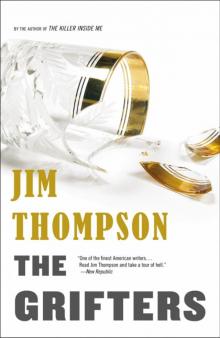 The Grifters
The Grifters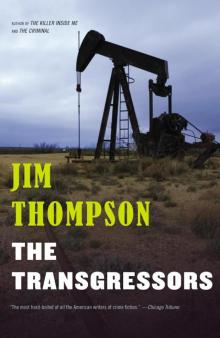 The Transgressors
The Transgressors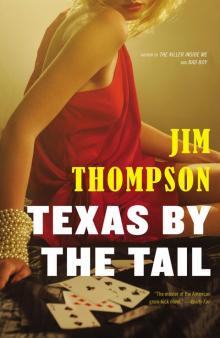 Texas by the Tail
Texas by the Tail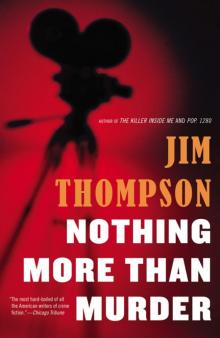 Nothing More Than Murder
Nothing More Than Murder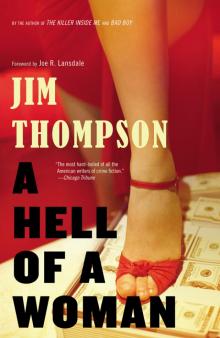 A Hell of a Woman
A Hell of a Woman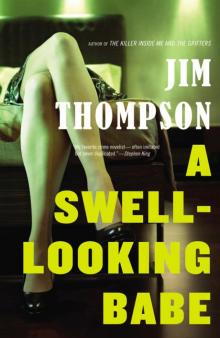 A Swell-Looking Babe
A Swell-Looking Babe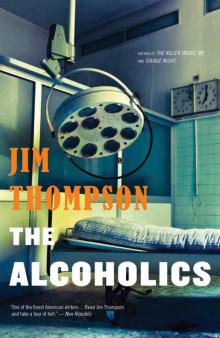 The Alcoholics
The Alcoholics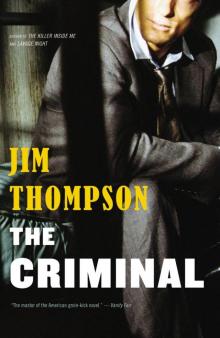 The Criminal
The Criminal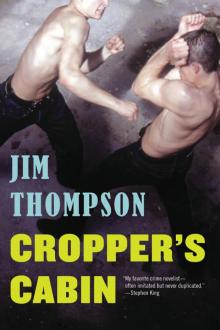 Cropper's Cabin
Cropper's Cabin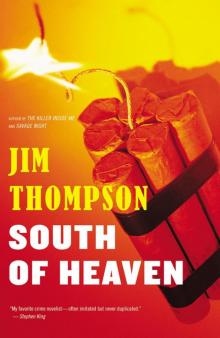 South of Heaven
South of Heaven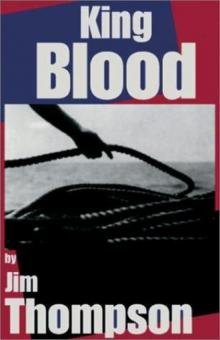 King Blood
King Blood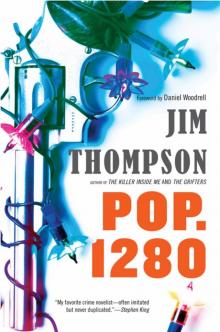 Pop. 1280
Pop. 1280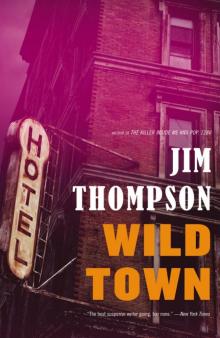 Wild Town
Wild Town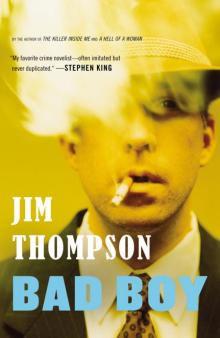 Bad Boy
Bad Boy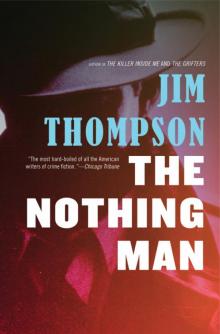 The Nothing Man
The Nothing Man The Killer Inside Me
The Killer Inside Me Heed the Thunder
Heed the Thunder Savage Night
Savage Night Recoil
Recoil Roughneck
Roughneck The Getaway
The Getaway